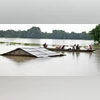19 dead, 11 injured in Balochistan as heavy monsoon rainfall causes havoc
According to the National Disaster Management Authority (NDMA), from July 1 to August 17, rain-related incidents have resulted in 195 deaths and 362 injuries across the country
)
Baloch Deputy Commissioner Farida Tareen from Sohbatpur reported that the Judair River overflowed, flooding the area and damaging rice fields | (Representative Photo: Reuters)
Listen to This Article
As of Monday, ongoing monsoon rains have caused significant damage in Balochistan, resulting in at least 19 deaths and 11 injuries, and affecting over 3,000 individuals, according to the Provincial Disaster Management Authority (PDMA), Dawn News reported.
While the monsoon rains from June to September provide relief from the summer heat and are vital for replenishing water supplies and supporting agriculture, they can also lead to severe weather-related disasters. Climate change is reportedly increasing the frequency and intensity of these events.
According to the National Disaster Management Authority (NDMA), from July 1 to August 17, rain-related incidents have resulted in 195 deaths and 362 injuries across the country, with 2,293 homes being damaged.
According to today's data from the Provincial Disaster Management Authority (PDMA), since July 1, there have been 19 deaths, 11 injuries, and 3,031 people affected, with 433 houses either partially or fully destroyed.
PDMA official Yunus Mengal said that 16 districts in Balochistan have been impacted by the recent rains, and relief efforts are ongoing. Mengal noted that Balochistan has experienced two severe monsoon events since July 1, reported Dawn News.
Also Read
In response to the disaster, the provincial government has declared an emergency in several union councils across the districts of Kalat, Ziarat, Awaran, Kachhi, Loralai, Sohbatpur, and Lasbela.
Kalat recorded the highest rainfall at over 48 millimeters, followed by Usta Muhammad with 34 mm, and Sibbi with 21 mm. Quetta and Khuzdar each saw 10 mm of rain, while Zhob and Chaman recorded 9 mm.
Baloch Deputy Commissioner Farida Tareen from Sohbatpur reported that the Judair River overflowed, flooding the area and damaging rice fields.
Balochistan's National Highway Authority General Manager Agha Inayatullah stated that all national highways in northern Balochistan remain open, with the authority and contractors working tirelessly to repair flood damage and maintain road access.
During the summer of 2022, Pakistan faced one of its worst flooding disasters, triggered by intense rainfall. Government reports indicate that the floods resulted in the deaths of 1,700 people, affected 33 million individuals, and caused widespread damage to homes and agricultural land.
The provinces of Sindh and Balochistan were hit hardest, with Balochistan alone reporting 336 fatalities, damage to or destruction of 426,897 homes, and the loss of 1,230 square kilometres (304,000 acres) of crops. Additionally, about half a million livestock perished, Dawn reported.
Senate Chairman Syed Yousuf Raza Gilani conveyed his profound sadness over the loss of life and damage to property caused by the recent heavy rains and floods, particularly affecting Balochistan and Khyber Pakhtunkhwa. Pointing out the difficulties Pakistan faces due to climate change, he urged people to take precautionary measures during the rainy season.
Senate Deputy Chairman Senator Syedaal Khan expressed sorrow over the devastation caused by the rains, stating that it was deeply upsetting and that he stood in solidarity with the victims during their time of mourning. He prayed for the quick recovery of the injured and stressed the importance of speeding up rescue and relief efforts. He also urged philanthropists to step forward and assist those affected by the disaster.
PPP Senator Sherry Rehman expressed regret over the fatalities from rain-related incidents, lamenting that Pakistan is once again experiencing the severe impacts of climate change.
She noted that the unusually intense monsoon rains have caused significant destruction and warned that the monsoon period is expected to continue until August 25, urging all relevant agencies to stay vigilant to prevent further damage.
(Only the headline and picture of this report may have been reworked by the Business Standard staff; the rest of the content is auto-generated from a syndicated feed.)
More From This Section
Don't miss the most important news and views of the day. Get them on our Telegram channel
First Published: Aug 20 2024 | 11:15 AM IST